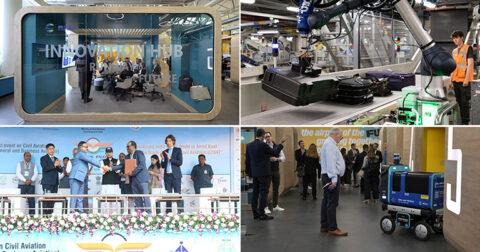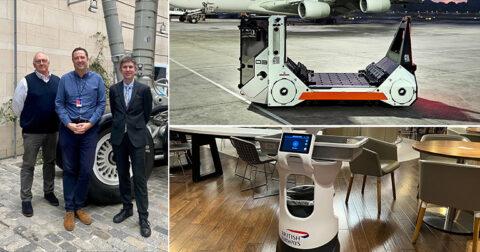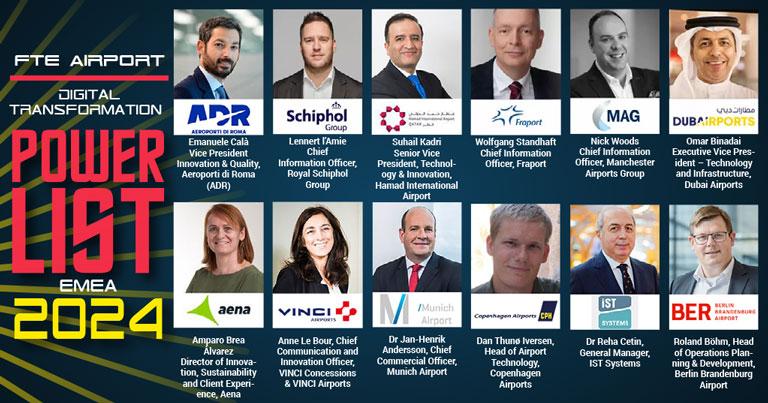
Future Travel Experience is excited to unveil the FTE Airport Digital Transformation Power List EMEA 2024. Here we shine a light on those who are pioneering new approaches that have the potential to improve travel for passengers and make the industry safer, more efficient and commercially successful. The EMEA edition champions the most transformative change enablers within the airline and airport industry in Europe, the Middle East and Africa for their outstanding efforts to lead how their organisation has embraced digital innovation. In 2024, FTE is more committed than ever to supporting digital transformation efforts in the industry through the FTE Digital, Innovation & Startup Hub, which is a truly unique community designed specifically for the individuals and organisations who are at the forefront of digital transformation and innovation in aviation. The FTE Hub is focusing on three key themes this year – Artificial Intelligence (AI), Robotics, and Internet of Things (IoT) – and in alignment with that, the Power List recognises those that are leading key digital transformation efforts. In recognition of their leadership and achievements, each member of the Power List will receive a complimentary “Golden Ticket” to the co-located FTE EMEA and FTE Ancillary & Retailing events, taking place in Dublin on 11-13 June 2024. After extensive research into each candidate, we believe the following 12 executives have been at the forefront of innovation, driving transformational change for their organisations and the wider industry.
Emanuele Calà, Vice President Innovation & Quality, Aeroporti di Roma (ADR)
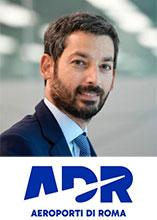
Emanuele Calà is the driving force behind Aeroporti di Roma’s (ADR) ‘Innovation Hub’, which opened in October 2022 at the heart of Fiumicino Airport’s Terminal 1. This is, importantly, delivering real, meaningful engagement with startups – something Future Travel Experience champions strongly via the FTE Digital, Innovation & Startup Hub, of which ADR is a Corporate Partner.
As FTE reported in this exclusive interview, ADR recently launched the third ‘Call4Startups’ as part of its ‘Runway to the Future Acceleration Program’, empowering the next generation of disruptors with the opportunity to embark on an eight-month journey to develop a Proof of Concept (POC), testing their solution within the ADR Innovation Hub supervised by members of the ADR Innovation Cabin Crew – a team of specialists supporting them in the development of their projects. The first two editions saw tangible results – in the first, 10 startups were selected with five progressing to commercial launch, while there are currently 13 international startups undergoing the final testing phase as part of the second edition. ADR has engaged with over 600 startups in the last two years, achieving an impressive 50% conversion rate from POC to implementation and testing 23 POCs.
The company has also launched ADR Ventures – an additional tool to help startups by financing the development of projects in areas with high innovation potential, operating from the Innovation Hub. This further illustrates ADR’s open innovation strategy. It is not only about providing finance, but also sharing know-how and skills to foster the development and growth of new companies and entrepreneurs to enhance digital transformation.
Some of the exciting innovation projects that ADR is focusing its energies on right now include autonomous wheelchair solutions, a real-time monitoring dashboard for airside operations through AI algorithms, an innovative solution which can provide passengers with a real-time view on the boarding gate status of their flight, sensors to monitor the proper disposal of waste in bins through AI, and biometric technologies.
Lennert l’Amie, Chief Information Officer, Royal Schiphol Group

Lennert l’Amie was appointed CIO of Royal Schiphol Group – a Corporate Partner of the FTE Digital, Innovation & Startup Hub – in February 2023, with a philosophy that “technology and data are crucial to continue to meet the challenges ahead, from passenger experience to the pressure on the labour market”.
He is playing a key role in furthering Schiphol Group’s Vision 2050, which looks “over the horizon” with three categories of innovation – Earth (incremental innovations), Moon (transformational innovations) and Mars (disruptive innovations). The emphasis is on “aiming for the Moon and Mars” with a central plan for fully autonomous airside operations by 2050.
Schiphol – an Airport Lab Network Partner of the FTE Baggage Innovation Working Group (BIWG) – is also looking to the future of baggage with disruptive, high quality services to make optimal use of capacity. As FTE exclusively reported here, Schiphol is launching a new initiative this year – being built in partnership with the BIWG – that will see a global coalition of airports accelerate baggage innovation together, with a focus on robotics and automation. Schiphol is also collaborating with security technology company Pangiam on next-stage trials of Project DARTMOUTH, which is intended to transform airport security screening using Artificial Intelligence to enhance inspection of carry-on bags.
Other transformational efforts include Digital Identity and becoming a multimodal hub with seamless transport connections. Schiphol also strongly believes in collaboration across the aviation industry. Airports face similar challenges and can speed up innovation by learning from best practices across the sector. It is, therefore, bringing its most innovative airport solutions, with proven business value at Amsterdam Airport Schiphol, to market via the Aviation Solutions division.
Suhail Kadri, Senior Vice President, Technology & Innovation, Hamad International Airport

Hamad International Airport is focused on continuous engagement and collaboration within the industry to provide a seamless passenger experience across the travel journey. Suhail Kadri, Senior Vice President, Technology & Innovation, leads Hamad International Airport’s efforts to be “the leading global digital airport”.
Having unveiled Phase A of its expansion plan ahead of the FIFA World Cup Qatar 2022, the airport is now in the midst of Phase B with plans to increase capacity to over 70 million passengers and construct two new concourses within the existing terminal. A central pillar of the strategy is significant investment in customer-centric innovative technologies to provide a fast, seamless travel experience. For example, next-generation, high-performance Wi-Fi 6 connectivity across the entirety of the airport lays the foundation for enhanced operations with better insights to provide an enhanced passenger experience; new Digital Assistance Kiosks form part of the overarching digital strategy to transform traveller experiences; and a recently announced collaboration with Cisco aims to advance digital transformation, revolutionise operations, enhance customer experience, and leverage innovative technologies. Following the successful preparations for the FIFA World Cup Qatar 2022, Hamad is now taking a progressive new approach to tech. It is forging that plan now and we expect some other exciting initiatives to be announced soon.
The airport’s Digital Twin platform is pioneering the future of airport management and tackling longstanding issues of sub-optimal decision-making, due to insufficient information, while accelerating the adoption of Machine Learning and Artificial Intelligence to make complex data analysis into simple recommendations, ushering in a new era of efficiency. The programme also incorporates data from ground handlers and airlines into the airport Digital Twin, which is a breakthrough in aviation stakeholders working together to drive benefits for all parties.
In addition to his position as Senior Vice President, Technology & Innovation at Hamad International Airport, Suhail Kadri is Immediate Past-Chair of the ACI World IT Standing Committee. Alongside delivering the airport’s vision of a frictionless passenger experience, he is therefore also recognised on the FTE Airport Transformation Power List EMEA 2024 for his strong leadership role within the industry.
Wolfgang Standhaft, Chief Information Officer, Fraport

Wolfgang Standhaft is leading Fraport’s merger of IT, digitalisation and transformation, including a comprehensive focus on Artificial Intelligence (AI) – one of the three key themes of the FTE Digital, Innovation & Startup Hub in 2024, alongside Robotics and Internet of Things (IoT) – via the AI@FRA initiative.
Fraport’s Digital Factory is key to its innovation efforts, further increasing the level of digital maturity within the Fraport Group and driving forward digital transformation alongside customer processes. The progressive approach of the Digital Factory is to identify market innovations early on and facilitate the implementation of compelling digital solutions for Fraport. Indeed, it is partnering with various startups to launch pilot projects. Digital Factory as a process framework for digitalisation has a proven track record with 35 projects launched, 24 successful Minimum Viable Products (MVP) developed, and 15 projects accompanied into rollout.
Fraport is also notable for the biggest biometrics implementation in the world. From enrolment at a kiosk or counter, to pre-security automated gates and self-boarding gates, passengers can use biometric technology to seamlessly pass through each stage of the journey by simply scanning their face. The project breaks new ground in the development of digital travel by providing a true common-use biometric platform at all terminals, open to all airlines operating at the airport. The implementation also plays a key part in paving the way for the rollout of biometrics across Star Alliance’s global network, as it endeavours to have more of its 26 member carriers using biometric technology progressively.
Meanwhile, Fraport is in the process of establishing a 5G campus network at Frankfurt Airport, which will be the largest private 5G network in Europe. Another highlight is its work with Artificial Intelligence (AI) – an area in which it has put together a team of experts to increase efficiency and service-orientation in the long-term.
Anne Le Bour, Chief Communication and Innovation Officer, VINCI Concessions & VINCI Airports

Under the leadership of Anne Le Bour, Chief Communication and Innovation Officer, innovation forms a major part of VINCI Airports’ strategy to improve airport infrastructure and management across its network of 70+ airports in 13 countries across Europe, Asia and the Americas.
VINCI Airports – a Corporate Partner of the FTE Digital, Innovation & Startup Hub – has three Centres of Excellence for Innovation at London Gatwick, Lyon-Saint Exupéry and Lisbon.
London Gatwick is an Innovation Centre of Excellence for airfield operations and sustainability. The airport operates the most efficient single-runway in the world and leads VINCI Airports’ innovation efforts to further improve capacity and performance. There is also a dedicated focus on sustainability, including waste management technology and recycling. Data capture at every phase of airfield operations, alongside the use of Machine Learning, further optimises in real-time both airport operations and the allocation of resources.
Lyon-Saint Exupéry is an Innovation Centre of Excellence for customer engagement and experience. In Lyon, VINCI Airports works on how to improve passengers’ overall travel experience. Among the many initiatives at Lyon-Saint Exupéry, VINCI Airports has launched Mona, a travel companion based on facial recognition.
Lisbon Airport is an Innovation Centre of Excellence for smart terminal operations and technology, and is working to reduce or even remove queuing and to improve all forms of flows of people, vehicles and baggage in terminals, without compromising safety or security. Biometric and single token travel is a priority for the Lisbon Centre of Innovation Excellence and it was recently announced that a new biometric experience is being launched at ANA Aeroportos de Portugal’s five biggest airports (Lisbon, Porto, Faro, Funchal and Ponta Delgada).
While a number of members of the VINCI Airports family, including the innovation team, have contributed to these projects, as VINCI Airports’ Chief Innovation Officer, Anne Le Bour is recognised on the Power List for her technology-focused leadership.
Nick Woods, Chief Information Officer, Manchester Airports Group

Nick Woods, Chief Information Officer, Manchester Airports Group (the most recent Corporate Partner of the FTE Digital, Innovation & Startup Hub) has played a key role in the £1.3 billion Manchester Airport Transformation Programme (MAN-TP) – a 10-year vision to revolutionise the customer experience. Central to this has been constant exploration of innovations and new technologies that can be applied to enhance the passenger journey. The Group is, for example, leveraging the cloud to deliver better services to passengers, while aiming to integrate new technologies such as Generative Artificial Intelligence in the future. It has worked closely with Amazon Web Services to digitally transform operations and passenger experience, with robust tech providing passengers with the right information, at the right time.
The final phase of MAN-TP – a £440 million investment to transform the passenger experience with state-of-the-art technology across all stages of the passenger journey from check-in to baggage reclaim – will be complete in 2025. Digital transformation efforts include the use of Artificial Intelligence and Machine Learning, and digitisation of equipment such as baggage systems.
The strategy spearheaded by Woods sees digital technology as inseparable from Manchester Airports Group’s continuous efforts to further enhance operational efficiency across its portfolio of Manchester, London Stansted and East Midlands airports.

The co-located FTE EMEA and FTE Ancillary & Retailing, taking place at the RDS in Dublin on 11-13 June 2024, will be a mega-event where the worlds of digital, commercial and CX will collide. One registration provides access to both events, where attendees will hear inspirational presentations from a number of the leading airports listed here including Royal Schiphol Group, Hamad International Airport, Munich Airport and Istanbul Airport, plus many more speakers from inside and outside the industry.Find out more and register to attend >>
Omar Binadai, Executive Vice President – Technology and Infrastructure, Dubai Airports
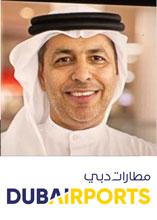
Omar Binadai took up the role as Executive Vice President – Technology and Infrastructure at Dubai Airports in October 2022, having played an important part in the delivery of the multibillion-dollar Phase 2 and Phase 3 expansions of Dubai International Airport. He is leading the transformation of Dubai Airports’ technology solutions in line with the growing impact that technology now has on infrastructure.
Dubai Airports’ focus on ensuring a seamless travel experience for passengers across all touchpoints includes significant investment in “customer service excellence” with a commitment to continually upgrading facilities and technology. Indeed, it is already testing technology that will eliminate the need to check-in, envisioning a scenario where travellers drop their bags, enjoy shopping or dining, and board their flight without any physical touchpoints.
Artificial Intelligence is another area of innovation through the biometric-based fast-track passport control service that has been deployed at 122 smart gates. This forms a key contribution towards enhancing customer experience and efforts to “make Dubai one of the smartest cities in the world”.
Meanwhile, there are plans to expand the ‘DXB&more’ mobile food & beverage and retail ordering service at Dubai International Airport into an all-encompassing digital DXB experience, bringing together digital entertainment partners, more shopping and live experiences for passengers already at the airport and those who are due to travel.
Fuelling the spirit of innovation, Dubai Airports also hosted CollaboraTech in 2023 – an event to equip its team with the latest tech, tools and software to shape the future of aviation.
While the immediate focus is on continued digital transformation at Dubai International Airport, plans are already well underway for significant expansion of the new airport – Al Maktoum International Airport – with the new mega-hub to be a true “airport of the future”.
Dr Jan-Henrik Andersson, Chief Commercial Officer, Munich Airport
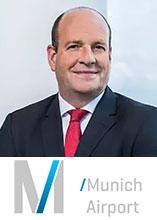
The digitisation and automation of processes in operational and commercial areas is a top priority at Munich Airport and Dr Jan-Henrik Andersson, while having the job title of Chief Commercial Officer, is central to these efforts. For example, a service robot has entered the test phase, with the ‘snackbot’ in Terminal 2 offering a selection of cold soft drinks and snacks that can be paid for with a variety of cashless payment methods. Another exciting field of activity for revolutionary robotics projects can be found on the apron. Together with Fraunhofer Institute (a member of the FTE Digital, Innovation & Startup Hub and the FTE Baggage Innovation Working Group), Munich Airport is developing the unique BagBOT. This robot will be equipped with innovative gripping technology and provide support for the remote-controlled loading and unloading of aircraft. The evoBOT is a further exciting test project with the Fraunhofer Institute. The dynamically stable robot which is being tested in the airport’s freight division can take on a wide range of tasks such as handling hazardous goods, transporting parcels over long, recurring distances and relieving strain during lifting and overhead work. Attendees at FTE Global 2023 were able to see the evoBOT in action, while Andersson shared Munich Airport’s holistic approach to digital transformation in the Future Airports conference track. Read the full event report here.
From summer 2024, Munich Airport will be testing one additional autonomous vehicle for freight transportation alongside the evoBOT, which could also be used for baggage transportation. In addition to service robots that are visible to passengers, navigation aids, biometric systems, autonomous vehicles, and loading and lifting aids, Munich Airport sees a clear trend toward software robotics.
The airport is also exploring how Artificial Intelligence (AI) and generative AI tools like ChatGPT can revolutionise areas such as travel retail, with dynamic offers and enhanced customer engagement.
As Chief Commercial Officer, Dr Jan-Henrik Andersson is instrumental in shaping Munich Airport’s innovation-focused approach to key technology trends.
Dan Thunø Iversen, Head of Airport Technology, Copenhagen Airports
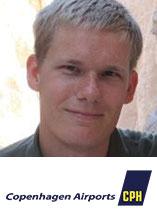
Copenhagen Airport’s vision is to be one of the world’s most digitised, embracing cutting-edge technology as it strives for enhanced efficiency and sustainability. As part of its digitisation journey, the airport has launched an innovative real-time data platform powered by Artificial Intelligence (AI). This, it says, revolutionises all aspects of the airport’s operations by consolidating various digital systems and processes, while also creating a modular foundation for implementation of future AI technologies. The aim is to support Copenhagen Airport’s twin goals of improving the passenger travel experience and making airport operations more sustainable.
Machine Learning and video analytics are also being embraced to optimise baggage handling processes, for example, enabling the airport to predict in real-time when bags will arrive on the conveyor belt for passengers to collect.
While a number of members of the Copenhagen Airports team are contributing to its continuing digitisation, as Head of Airport Technology since October 2023 Dan Thunø Iversen is now playing a key role in delivering the technology-focused vision.
Amparo Brea Álvarez, Director of Innovation, Sustainability and Client Experience, Aena

Aena’s innovation and digital transformation strategy is based on using technology to improve current business and to develop new businesses. The operator, which manages a network of 46 airports in Spain, aims to be an international leader in the use of digital tools with the objective of optimising the passenger experience, increasing operational efficiency and developing new businesses around sustainable mobility.
The vision includes three strategic programmes:
- Passenger knowledge: deploying technologies to simplify the passenger’s journey and make it a seamless process, with no waiting times and no contact. Achieving adequate knowledge of passengers to offer them an optimal experience.
- Efficient use of resources: automating airport management processes and developing towards as-a-service models.
- Beyond the airport: exploring new business areas related to sustainable mobility.
Among the technologies Aena is exploring to further enhance the traveller experience are biometrics, Artificial Intelligence, and Augmented and Virtual Reality. For example, facial recognition technology has been implemented at Menorca, Adolfo Suárez Madrid-Barajas and Josep Tarradellas Barcelona-El Prat airports; the Aena Maps tool enables passengers to know their current location, look for points of interest, calculate the best route, and see distances and travel times required; while the Food to Fly pre-order service allows travellers to order their meal and collect it at the airport.
The airport operator is also embracing innovation through the Aena Ventures startup accelerator.
As Director of Innovation, Sustainability and Client Experience, Amparo Brea Álvarez is recognised for her leadership in fostering a culture of entrepreneurship and innovation, while promoting the company’s sustainability and climate change policies.
Dr Reha Çeti̇n, General Manager, IST Systems
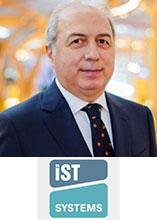
Dr Reha Çeti̇n is General Manager of IST Systems, which was established with the purpose of being the master systems integrator for the new Istanbul Airport and aims to operate smart building systems utilising next-generation technologies. Leading Istanbul Airport’s dedicated IT company, he is therefore effectively its CIO.
Istanbul Airport has declared 2024 the “Year of Investments”. The airport invested €160.1 million in 2023 and has announced an investment target of €656.5 million for 2024, including a key focus on passenger satisfaction which is firmly at the top of the agenda. Following a study conducted by GfK Research Company over three years, the public’s appreciation rate of Istanbul Airport has increased continuously, reaching 89% in 2023, and is expected to grow further.
Istanbul Airport places its mobile app at the centre of its digital journey approach and has a clear objective to add further functions to the interface and be a pioneer of next-generation digital experiences. Keeping passenger feedback at the forefront, the airport recently developed a new version of the app based on extensive research and analysis to nurture its vision of a digital customer journey. One element of this is an Augmented Reality (AR) shopping experience. Indeed, Istanbul Airport’s service featuring AR technology provides passengers with information about retail outlets by accompanying them around the shopping area. The AR technology allows users to see objects virtually and in 3D, providing an interactive real-world environment. Innovative technologies in the retail environment also include ‘virtual mirrors’, which allow customers to ‘try-on’ items without physically putting them on.
Technologies such as Big Data, biometrics and the Internet of Things are also being utilised to enhance the passenger experience. Meanwhile, passenger processing systems are empowered by biometrics with facial recognition technology, and innovative digital solutions are being employed to assist passengers with reduced mobility.
Roland Böhm, Head of Operations Planning & Development, Berlin Brandenburg Airport
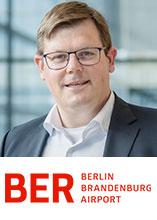
While Roland Böhm has just taken up a new role as Head of Operations Planning & Development at Berlin Brandenburg Airport (BER), he was until very recently Head of Infrastructure & Systems and remains central to the airport’s innovation and digital transformation efforts.
BER – a Corporate Partner of the FTE Digital, Innovation & Startup Hub – continuously strives to increase service quality and improve both passenger experience and operational efficiency. These efforts include significant investment in the development and implementation of digital products. Key elements include innovations such as BER Runway and the biometric solution BER Traveller, which aim to put passengers in control of their journey and at the same time pave the way for a more seamless travel experience.
The BER Runway service allows travellers to expedite the airport security screening process by reserving a timeslot. Meanwhile, BER Traveller is a digital service for biometric access control launched in collaboration with Lufthansa Group, which uses facial recognition for faster, smarter passenger processes along the airport journey.
BER is also exploring Artificial Intelligence (AI) and is, for example, using an AI-based software solution to optimise its handling processes. While the most recently introduced digital products at BER have focused primarily on terminal operations, the focus is now also on the airfield, which in turn contributes to a good travel experience for passengers with stable processes and reliable flight schedules. The software’s Machine Learning feature is also providing BER with valuable insights to help further develop AI-powered processes.


